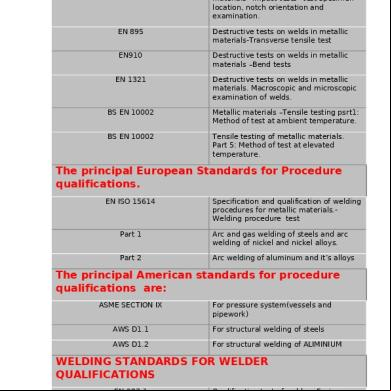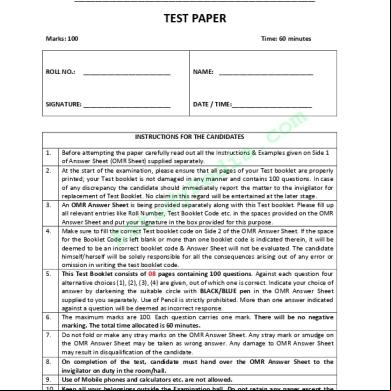Ogp Standards 60691h
This document was ed by and they confirmed that they have the permission to share it. If you are author or own the copyright of this book, please report to us by using this report form. Report 2z6p3t
Overview 5o1f4z
& View Ogp Standards as PDF for free.
More details 6z3438
- Words: 1,033
- Pages: 17
International Standards Workshop, Astana, Kazakhstan 25/26th May 2005
Moving towards international standards in the oil and gas industry Dr Donald Smith Technical Manager OGP
What is OGP? • The International Association of Oil & Gas Producers formed in 1974. • OGP include the world’s leading private and state-owned oil and gas companies, their national and regional associations and major upstream contractors and suppliers. • produce more than half of the world’s oil and about one third of its gas. • Offices in London and Brussels
OGP vision To work on behalf of all the world’s upstream companies to promote responsible and profitable operations
OGP mission • To represent the interests of the upstream industry to international regulatory and legislative bodies • To achieve continuous improvement in safety, health and environmental performance and in the engineering and operation of upstream ventures • To promote awareness of Corporate Social Responsibility within the industry and among stakeholders
OGP Organisation Management Committee Secretariat
Environmental Quality Committee
Health Committee
Safety Committee
Legal Committee
Committee for Meteorology & Oceanography
EU Committee
Standards Committee
Offshore Structures Committee
Why make ISO/IEC standards? • To facilitate global trade • Transfer and maintain an international experience & best practices carrier, for improved solutions • Offers global expert networking possibilities • Open, voluntary participation & use of standards • Simple and safe design and fabrication • Reduce need for company specifications • Reduce need for national regulations Made for and by the E&P industry Therefore OGP takes an interest in standards
OGP Standard Committee hip Representative
Company
Wilson Barbosa de Oliveira Anatoly Baryshnikov Gerhard Froelich Alf Reidar Johansen (Chair) Alain Loppinet Greg Lever Martin Maeso David Miller Saif Al Naimi Terry Qin Neil Reeve Alain Samne Cheryl Stark Mike Swidzinski Graham Thomas Richard Torgersen Ramon Torra Gilles Trican
Petrobras Eni WEG Hydro BNPe PetroCanada Energy Institute API Qatar Petroleum SC Shell ISO BP ConocoPhillips EUROPIA/BP 2 ExxonMobil Repsol-YFP Total
1
Country Brazil Italy Norway Canada UK USA Qatar China Netherlands Switzerland USA UK UK USA Spain
1
Other functions
CEN/TC12 Chair
API Std. Progr. dir.
IFAN President ISO/TC67 Progr. mgr. ISO/TC67 Chair EUROPIA SOEAG Chair
Plus corresponding from: BG, Chevron, DONG, Mærsk, Premier and Saudi Aramco. 2 EUROPIA liaison.
OGP Standards Committee of References The main role is to serve as a forum for sharing information on standards work, agreeing issues, coordinating and developing recommendations and positions on standards issues of interest and value to the E&P industry worldwide. Specifically to: • • • • • • • • •
monitor and promote development of international standards share best practices of companies in-house standardisation work liaise with standards organisations, such as API stewardship of the OGP’s liaison hips with ISO and CEN seek to influence efficient use of resources identify areas where the OGP should take a pro-active role review progress, ensure priorities are suitable for OGP ensure that OGP are adequately represented promote use of standards within member companies
OGP position on standards The OGP has been a catalyst for change in industry ’s approach to standards and strongly s the internationalisation of key standards used by the Petroleum and Natural Gas Industries. OGP ’s position on standards is: – – – – – – –
development and use of ISO and IEC standards should be promoted development of standards should be based on a consensus of need “s” should be represented on standards work groups duplication of effort should be avoided standards should be simple and fit for purpose International standards should be used without modification wherever possible company specifications should be minimised and written, where possible, as functional requirements. The adoption of this approach is expected to minimise barriers to trade, enable more efficient worldwide operations, and improve the technical integrity of equipment, materials, and offshore structures used by the Petroleum and Natural Gas Industries.
Standardisation bodies – relationships RR ee cc oo gg nn ii ss ee dd
ISO / IEC
International
Vienna Agreement
CEN / Regional National
ANSI
Associations
API
Industry
ABNT, SCC etc.
DS
OGP
ASME
CONTRACTORS
CENELEC
L i a i s o n s
European
BNPe
OPERATORS
ACADEMIA
BSI & other
EEMUA etc. SUPPLIERS
AUTHORITIES
OGP & ISO initiative • OGP ed the ISO initiative in 1987 to develop ISO standards for the Petroleum & Natural Gas Industry. • This created a global arena for standards development, where all nations concerned have a role to play. • OGP ed also the desire for ANSI/API, US, to assume responsibility for the ISO/TC67 secretariat.
TC67 Materials, equipment and of f shore structures f or petroleum, petrochemical and natural gas industries Executive and Management Committees WG 2 Conf ormity A ssessment SC 2 Pipelines
SC 3 Drilling and w orkover f luids, and cements
SC 4 Drilling and production equipment
SC 5 OCTG
SC 6 Ref inery equipment
SC7 Of f shore structures
WG 4 Reliability engineering & technology WG 5 A luminium alloy pipe WG 7 Materials f or use in H2S containing environments WG 9 Lif e cycle costing
New standards for the Oil and Gas Industry OGP promotes the development and use of ISO and IEC standards International standards should be used wherever possible
New standards for the Oil and Gas Industry OGP promotes the development and use of ISO and IEC standards International standards should be used wherever possible
Standards Published: 109 API Adoptions: 36 CEN Adoptions: 79 Kazakhstan is encouraged to adopt these international standards.
OGP Plan for 2005 and beyond • Continue to the development of ISO/IEC standards • Monitor and influence adoption of ISO standards • Plan new standards workshop or .... • Consider new “standards summit” meeting • Work with regulators (eg through the International Regulators Forum) to further the recognition of ISO/IEC standards within local regulations
Concluding Remarks • The O&G industry has the knowledge and resources to produce the standards it needs. • the ISO and IEC work. • Capture the value added by making use of new ISO and IEC standards • Work with your national standards bodies and regulators to adopt and reference international ISO & IEC standards.
Global Standards Used Locally Worldwide www.ogp.org.uk
www.iso.org
www.iec.ch
Moving towards international standards in the oil and gas industry Dr Donald Smith Technical Manager OGP
What is OGP? • The International Association of Oil & Gas Producers formed in 1974. • OGP include the world’s leading private and state-owned oil and gas companies, their national and regional associations and major upstream contractors and suppliers. • produce more than half of the world’s oil and about one third of its gas. • Offices in London and Brussels
OGP vision To work on behalf of all the world’s upstream companies to promote responsible and profitable operations
OGP mission • To represent the interests of the upstream industry to international regulatory and legislative bodies • To achieve continuous improvement in safety, health and environmental performance and in the engineering and operation of upstream ventures • To promote awareness of Corporate Social Responsibility within the industry and among stakeholders
OGP Organisation Management Committee Secretariat
Environmental Quality Committee
Health Committee
Safety Committee
Legal Committee
Committee for Meteorology & Oceanography
EU Committee
Standards Committee
Offshore Structures Committee
Why make ISO/IEC standards? • To facilitate global trade • Transfer and maintain an international experience & best practices carrier, for improved solutions • Offers global expert networking possibilities • Open, voluntary participation & use of standards • Simple and safe design and fabrication • Reduce need for company specifications • Reduce need for national regulations Made for and by the E&P industry Therefore OGP takes an interest in standards
OGP Standard Committee hip Representative
Company
Wilson Barbosa de Oliveira Anatoly Baryshnikov Gerhard Froelich Alf Reidar Johansen (Chair) Alain Loppinet Greg Lever Martin Maeso David Miller Saif Al Naimi Terry Qin Neil Reeve Alain Samne Cheryl Stark Mike Swidzinski Graham Thomas Richard Torgersen Ramon Torra Gilles Trican
Petrobras Eni WEG Hydro BNPe PetroCanada Energy Institute API Qatar Petroleum SC Shell ISO BP ConocoPhillips EUROPIA/BP 2 ExxonMobil Repsol-YFP Total
1
Country Brazil Italy Norway Canada UK USA Qatar China Netherlands Switzerland USA UK UK USA Spain
1
Other functions
CEN/TC12 Chair
API Std. Progr. dir.
IFAN President ISO/TC67 Progr. mgr. ISO/TC67 Chair EUROPIA SOEAG Chair
Plus corresponding from: BG, Chevron, DONG, Mærsk, Premier and Saudi Aramco. 2 EUROPIA liaison.
OGP Standards Committee of References The main role is to serve as a forum for sharing information on standards work, agreeing issues, coordinating and developing recommendations and positions on standards issues of interest and value to the E&P industry worldwide. Specifically to: • • • • • • • • •
monitor and promote development of international standards share best practices of companies in-house standardisation work liaise with standards organisations, such as API stewardship of the OGP’s liaison hips with ISO and CEN seek to influence efficient use of resources identify areas where the OGP should take a pro-active role review progress, ensure priorities are suitable for OGP ensure that OGP are adequately represented promote use of standards within member companies
OGP position on standards The OGP has been a catalyst for change in industry ’s approach to standards and strongly s the internationalisation of key standards used by the Petroleum and Natural Gas Industries. OGP ’s position on standards is: – – – – – – –
development and use of ISO and IEC standards should be promoted development of standards should be based on a consensus of need “s” should be represented on standards work groups duplication of effort should be avoided standards should be simple and fit for purpose International standards should be used without modification wherever possible company specifications should be minimised and written, where possible, as functional requirements. The adoption of this approach is expected to minimise barriers to trade, enable more efficient worldwide operations, and improve the technical integrity of equipment, materials, and offshore structures used by the Petroleum and Natural Gas Industries.
Standardisation bodies – relationships RR ee cc oo gg nn ii ss ee dd
ISO / IEC
International
Vienna Agreement
CEN / Regional National
ANSI
Associations
API
Industry
ABNT, SCC etc.
DS
OGP
ASME
CONTRACTORS
CENELEC
L i a i s o n s
European
BNPe
OPERATORS
ACADEMIA
BSI & other
EEMUA etc. SUPPLIERS
AUTHORITIES
OGP & ISO initiative • OGP ed the ISO initiative in 1987 to develop ISO standards for the Petroleum & Natural Gas Industry. • This created a global arena for standards development, where all nations concerned have a role to play. • OGP ed also the desire for ANSI/API, US, to assume responsibility for the ISO/TC67 secretariat.
TC67 Materials, equipment and of f shore structures f or petroleum, petrochemical and natural gas industries Executive and Management Committees WG 2 Conf ormity A ssessment SC 2 Pipelines
SC 3 Drilling and w orkover f luids, and cements
SC 4 Drilling and production equipment
SC 5 OCTG
SC 6 Ref inery equipment
SC7 Of f shore structures
WG 4 Reliability engineering & technology WG 5 A luminium alloy pipe WG 7 Materials f or use in H2S containing environments WG 9 Lif e cycle costing
New standards for the Oil and Gas Industry OGP promotes the development and use of ISO and IEC standards International standards should be used wherever possible
New standards for the Oil and Gas Industry OGP promotes the development and use of ISO and IEC standards International standards should be used wherever possible
Standards Published: 109 API Adoptions: 36 CEN Adoptions: 79 Kazakhstan is encouraged to adopt these international standards.
OGP Plan for 2005 and beyond • Continue to the development of ISO/IEC standards • Monitor and influence adoption of ISO standards • Plan new standards workshop or .... • Consider new “standards summit” meeting • Work with regulators (eg through the International Regulators Forum) to further the recognition of ISO/IEC standards within local regulations
Concluding Remarks • The O&G industry has the knowledge and resources to produce the standards it needs. • the ISO and IEC work. • Capture the value added by making use of new ISO and IEC standards • Work with your national standards bodies and regulators to adopt and reference international ISO & IEC standards.
Global Standards Used Locally Worldwide www.ogp.org.uk
www.iso.org
www.iec.ch










